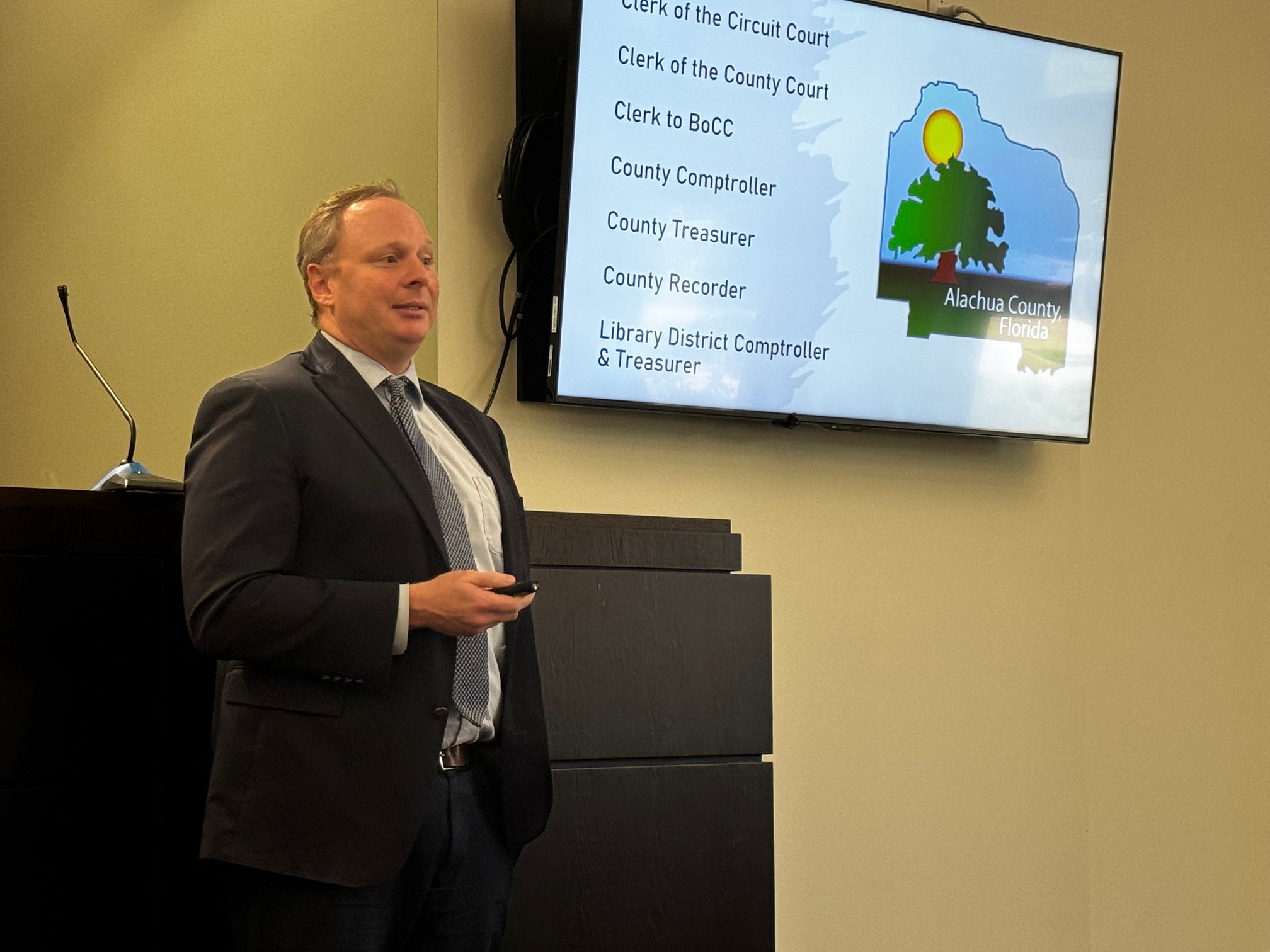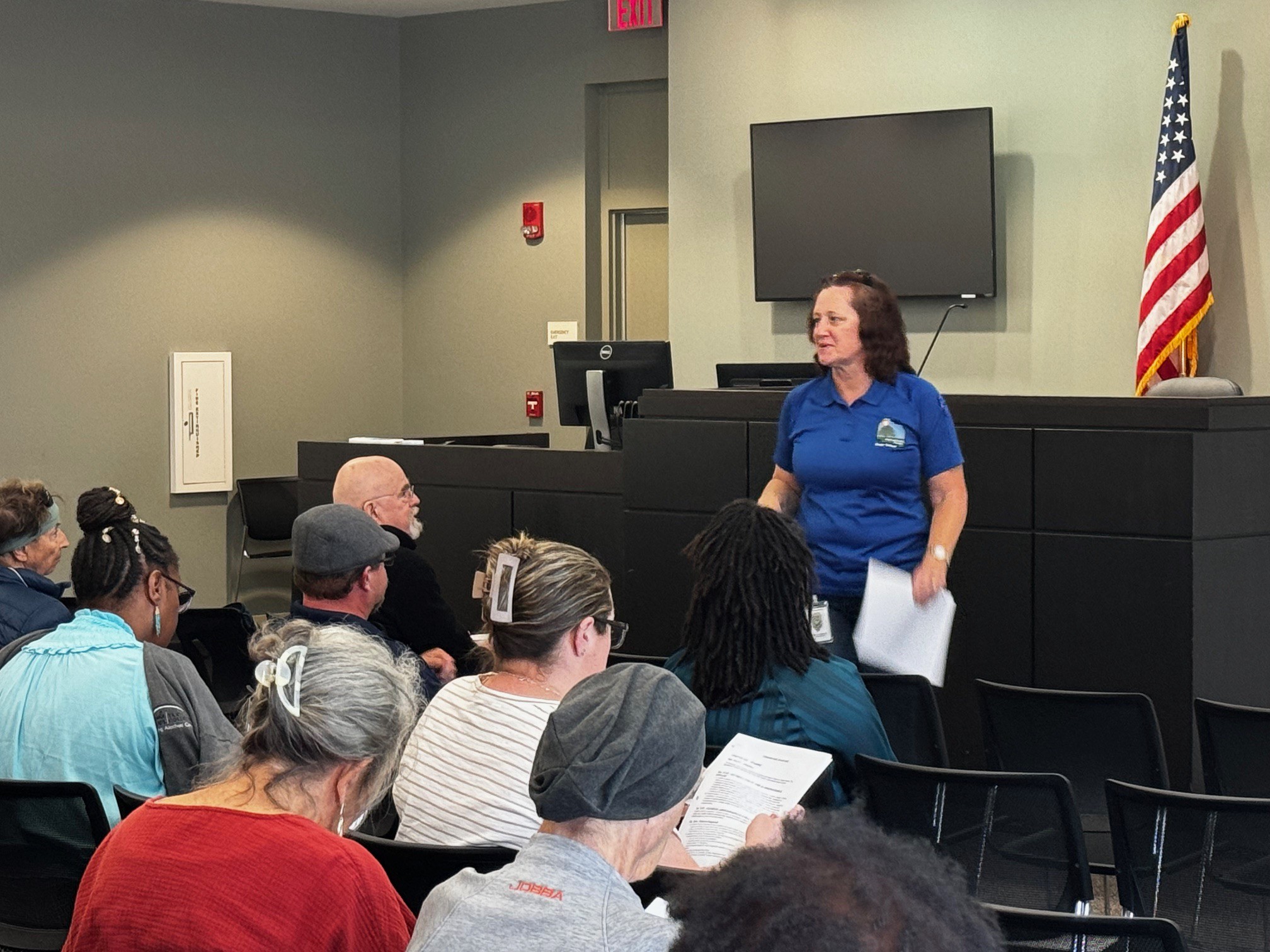Dozens of Alachua County residents voluntarily went to criminal court Thursday for a crash course in the judicial system.
No, they weren’t in trouble.
They were part of Alachua County’s Citizen Academy, where participants were given the basic in-and-outs of how the courts operate from the area’s top elected legal minds.
The eight-week educational course, run by Alachua County Strategic Performance Manager Donna Bradbrook, partners with local constitutional officers, judicial officers, library district, school board and health department to give residents a unique opportunity to learn about various aspects of local government and the daily activities performed by some of the county’s top officials.
“I’ve learned things that I don’t know how else I would’ve found out about without doing some deep diving, things I didn’t previously have an interest in or thought about,” said academy participant Jack Kulas. “It broadens your horizons, and you appreciate the complexity of government.”
Court system
State Attorney Brian Kramer, Public Defender Stacy Scott and Judge Susan Miller-Jones, all of the Eighth Judicial Circuit, spoke to the room about their different roles in the court system and their awareness of the hurdles some face.
 Roughly 96% of criminal cases that go through Alachua County never actually make it to a trial, Scott said. That’s because the system is set up to encourage plea negotiations. Scott said her office, which typically represents indigent clients, investigates the facts of each case and assesses the risks before her client decides whether it’s worth going to trial. Because the penalties can be extreme, she added, people will often enter into a diversion plan or plea agreement with the prosecution.
Roughly 96% of criminal cases that go through Alachua County never actually make it to a trial, Scott said. That’s because the system is set up to encourage plea negotiations. Scott said her office, which typically represents indigent clients, investigates the facts of each case and assesses the risks before her client decides whether it’s worth going to trial. Because the penalties can be extreme, she added, people will often enter into a diversion plan or plea agreement with the prosecution.
The plea system, in many ways, is considered a trade-off, as more trials would mean more needed resources.
Kramer said his office handles close to 18,000 cases annually. If more cases went to trial, it would require more judges and staff, which would lead to increased costs and taxes for residents.
Miller-Jones, who rules over cases debated between the two offices, said she tries to consider what’s best for the people coming before her courtroom. Sometimes that means entering a defendant into drug abuse or mental health programs instead of jail.
Clerk of the Court
Many people may not know it, but Clerk of the Court and Comptroller J.K. “Jess” Irby and his office do far more than simply record court cases. He and his office offer services to all residents, the Bar, the judiciary offices, the library district, Board of County Commissioners and other government offices.
Last year alone, the clerk’s office handled roughly 13,500 circuit cases (felony, family, domestic violence, etc.) and more than 30,000 county court cases (traffic, small claims, misdemeanors, etc.). The courthouse held proceedings during all 365 days of the year in 2023.
 Other jobs include:
Other jobs include:
- Officiating weddings and issuing licenses;
- Jury management;
- Conducting foreclosure and surplus sales;
- Keeping minutes of court proceedings and maintaining all court documents;
- Collecting over $20 million for traffic fines and fees annually;
- Collecting over $20 million in child support payments;
- Holding evidence and exhibits for cases;
- Digitizing Ancient Records.
The clerk’s office also offers residents assistance through its Self Help department, allowing people to better navigate the court system on their own. The office allows people to bypass the costly expense of hiring lawyers and print out their own documents for filing. People can even do it from the comfort of their homes.
In 2023, Alachua County saw nearly 144,000 electronic filings for civil cases. Though many are done by attorneys representing clients, a large chunk are Pro Se cases that saved residents thousands of dollars.
As comptroller, Irby’s office is also responsible for Alachua County’s debt management, financial statements, payroll and accounting and minutes for the Board of County Commissioners.
Code Enforcement
The last speaker of the day was Codes Officer Greta Moreau, who explained to the class how typical code violations are handled.
She explained the recent changes in state law about reporting:
“A code enforcement officer may not initiate an investigation of a potential violation of a duly enacted code or ordinance by way of an anonymous complaint. A person who reports a potential violation of a code or an ordinance must provide his or her name and address to the respective local government before an investigation may occur. This paragraph does not apply if the code enforcement officer has reason to believe that the violation presents an imminent threat to public health, safety, or welfare or imminent destruction of habitat or sensitive resources.”
 Most of the cases handled by codes are junk cars, trash and overgrown grass. They also investigate livestock density in residential areas.
Most of the cases handled by codes are junk cars, trash and overgrown grass. They also investigate livestock density in residential areas.
During every election season, political signs placed in the public right of ways are an issue, Moreau said. Her office has no problem picking up those signs, she added, and warned residents to be cautious when removing signs themselves.
The office also investigates minimum housing standards in landlord/tenant disputes.
For more information, contact Alachua County Public Information Officer Andrew Caplan at 352-264-6975 or
acaplan@alachuacounty.us.